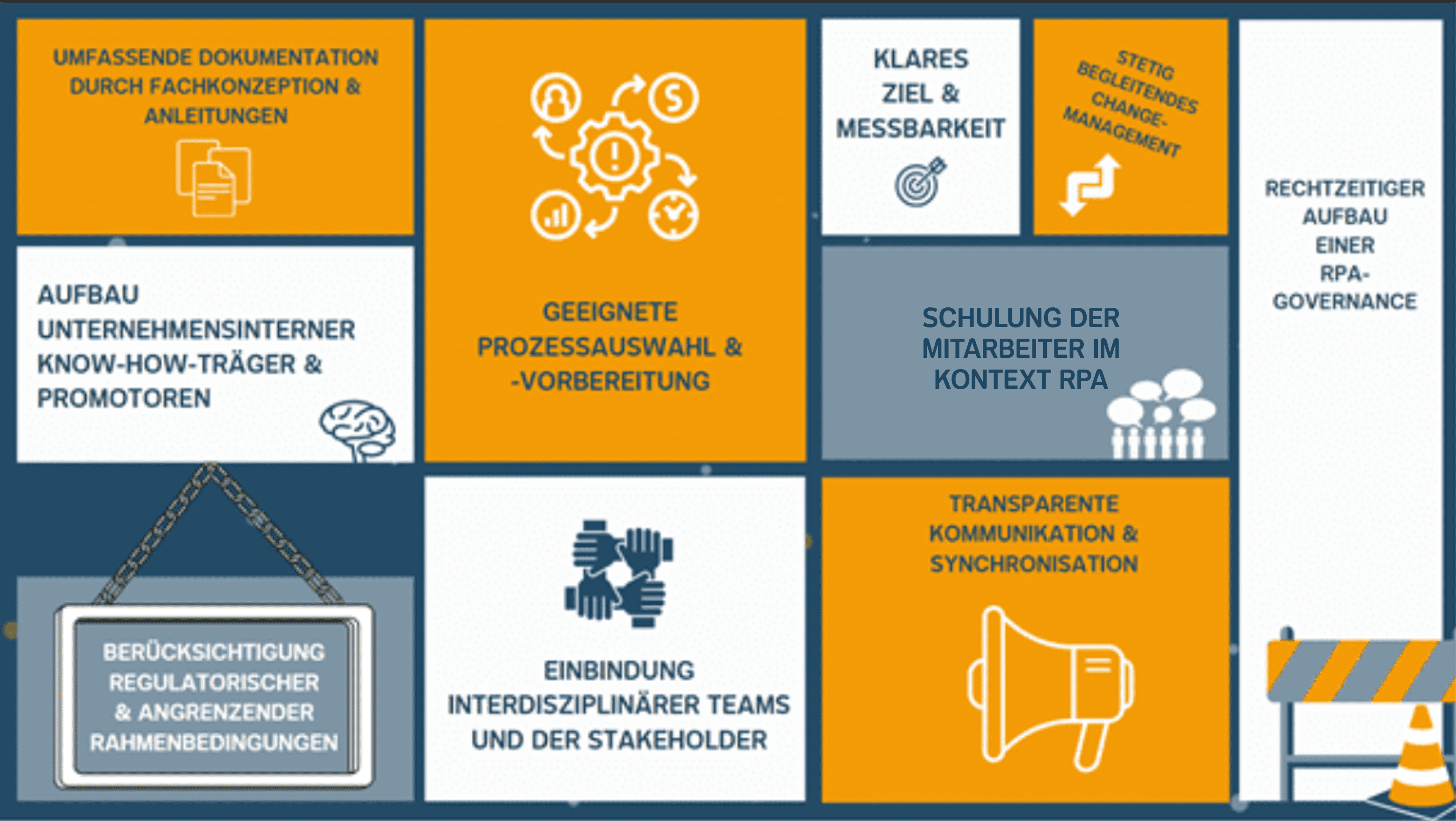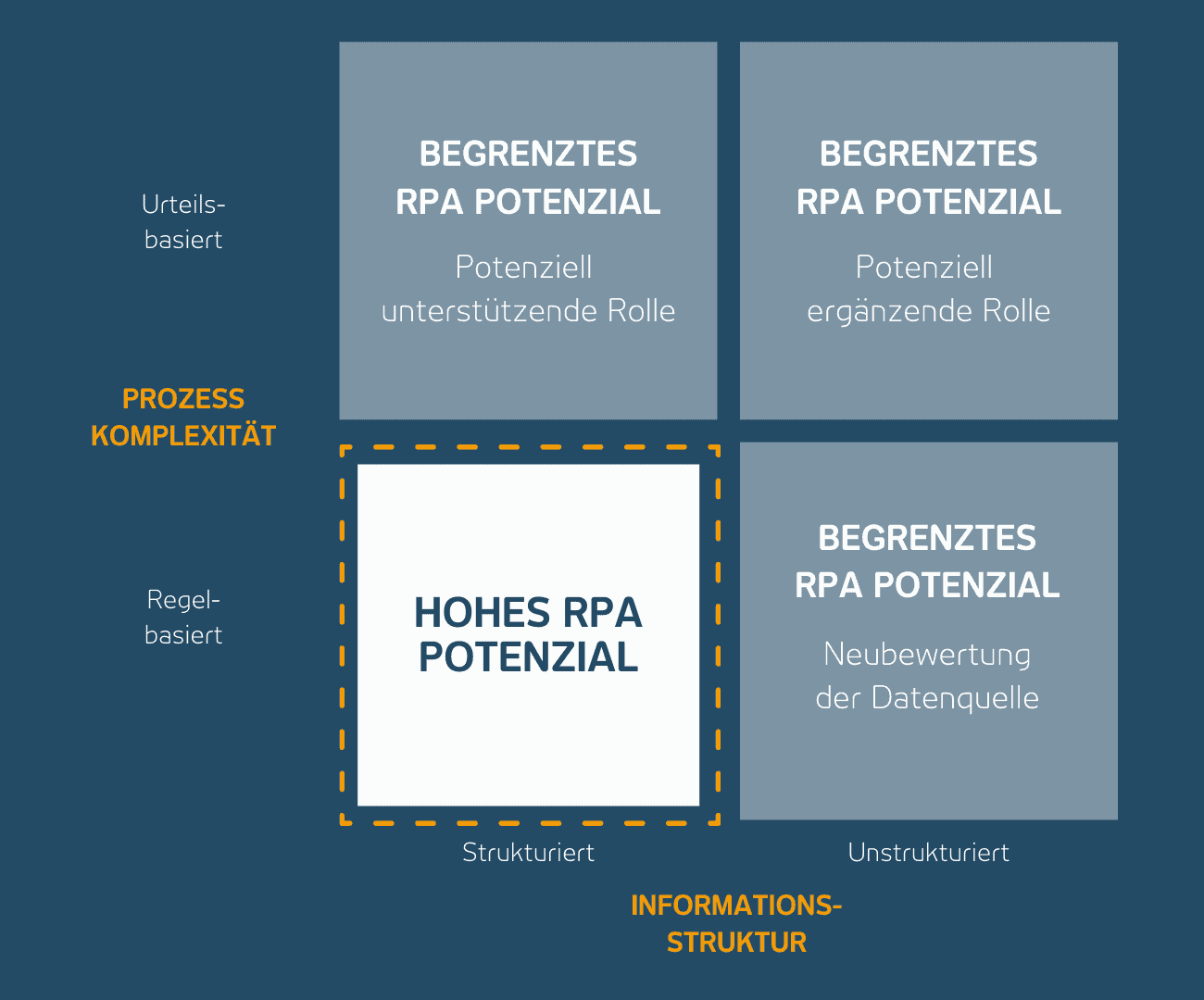ROBOTIC PROCESS AUTOMATION
Robotic Process Automation, or RPA for short, is a software solution for automating IT-based, recurring processes. With the help of RPA, such rule-based tasks can be executed automatically – around the clock, 365 days a year. The RPA bots enable the use and interpretation of existing IT applications, as well as transaction processing, data processing and communication across multiple IT systems.
RPA offers numerous benefits across many different industries and organizations. ADWEKO helps you to unfold your potentials through tailor-made RPA solutions. Whether it is an initial analysis of future automation potentials through a process analysis and evaluation, you have specific questions about RPA or you are considering concrete implementations with RPA. We are at your disposal as a competent contact partner.
CENTRALISATION OF THE BACK OFFICE AREAS
TECHNOLOGICAL PROGRESS
CROSS-DIVISIONAL AUTOMATION
CENTRALISATION OF THE BACK OFFICE AREAS
TECHNOLOGICAL PROGRESS
CROSS-DIVISIONAL AUTOMATION
WHERE IS IT WORTH IMPLEMENTING AN RPA SOLUTION?
From ADWEKO’s perspective, the application areas have evolved since the 2019 survey; for example, we have already successfully implemented robots in accounting and overall bank management to address the need for increased efficiency and cost reduction.
In addition to the cost savings that can result from investing in RPA, it is important to leverage the potential from the strategic long-term value and ROI that customers, employees as well as shareholders can realize (“triple-win”).
- Back office (active) 83%
- Back office (passive) 73%
- IT 27%
- Accounting 23%
- Distribution 23%
- Risk management 17%
- Controlling 13%
- Staff 10%
- Reg. Reporting 7%
- Compliance 3%
Possible applications of RPA
RPA development
success factors
Digital transformation is one of the trends that will greatly influence the future society. In the business environment, digital restructuring can enable end-to-end processing, allowing customers to search for, order/complete, pay for and receive products and services online.
When implementing an RPA project, it is common for the business process automation to be configured by the business operations/ specialist department,
such as the enterprise and desktop RPA tools. IT should be involved to support more complex automation and IT implementations should be communicated in order to avoid cross-effects. In principle, ADWEKO recommends setting up a Center of Excellence in which the stakeholders of the RPA project share responsibility.
success factors
Right at the beginning of the RPA implementation, it is important to focus on the factors that are critical to success. In addition to observing the principles of action, there are other success factors that need to be taken into account for a sustainably successful RPA implementation.
RPA is suitable for task processing and process automation with a medium to high transaction volume and a low to medium degree of process complexity. The robot interacts with other software applications in the same way as human employees, for example by authenticating themselves with user names and passwords. In principle, it is possible to apply robots to any software that humans use for task processing.
YOUR VALUES
After the processes to be automated have been sufficiently examined with regard to their underlying prerequisites (process evaluation), the following added values can be identified and realized after an RPA implementation.
WHEN IS RPA WORTHWHILE ?
Within the scope of an RPA implementation, certain minimum requirements must be met in order to automate business processes. These include digitally readable data, structured and uniformly prepared data, a rule-based process flow, and processes with as few exceptions as possible. RPA is most effective – and offers the highest potential – for simple processes with structured data.
OUR OFFER FOR YOU
- Preparation and implementation of workshops to support end users and administrators
- Administrative support of RPA activities incl. Maintenance management of the RPA bots
- Consulting on the introduction of a Center Of Excellence and governance model to establish a stable RPA function.
- Customer-specific process evaluation to determine the suitability of an RPA implementation
- Accompanying the implementation of an RPA project (holistic consulting approach)
- Process analysis and optimization (design, development and test)
- Hypercare/Monitoring
Whether it is an initial analysis of future automation potentials through a process analysis and evaluation, you have specific questions about RPA or you are considering concrete implementations with RPA:
Our RPA experts will be happy to advise you on the path of your digitization strategy using innovative, customer-specific solution approaches for the automation of business processes.






